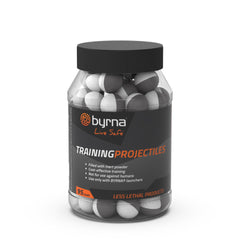
Property owners who want to protect their homes with pepper spray run into a pretty big legal headache. Most states do allow you to defend your home and family from real threats. The problem is that if you spray the wrong person or use it at the wrong time, you could be looking at assault charges, expensive court cases or worse consequences.
The difference between legal self-defense and criminal assault depends on a few main factors. Was the person just walking across your lawn, or were they actually threatening you with violence? Are you inside your own home, on your front porch or at your business? Each state has its own laws on when pepper spray crosses the line from protection to prosecution, and those laws can change dramatically based on the exact circumstances.
Here's what you need to know about pepper spray laws on private property!
Table of Contents
What the Law Says About Self-Defense
The law around self-defense on your own property is actually pretty simple. You need to prove two main elements if you ever need to pepper spray anybody who's threatening you. The first one is that you have what the courts call an "imminent threat," and the second is that whatever you do in response has to be proportional, given what was happening to you at the time.
Imminent is a legal term with a very particular meaning here. The threat can't be something from last week, and it can't be something you're worried might happen tomorrow or next month. We're talking about danger that's happening right then and there - in real-time as the situation unfolds. Someone who won't get off your lawn after you tell them to leave? That's annoying, and it's trespassing. But it probably doesn't meet the standard for imminent danger. An intruder who's actively trying to break through your door or who's coming at you with their fists up and ready to fight? That's a very different scenario, and the law recognizes that distinction.

The proportional force requirement is where a lot of property owners run into problems because it's not always black and white. Courts are going to look at whether an average, sensible individual would have felt genuinely threatened in the exact same circumstances you were in. They'll also consider whether you had other options available to you. The People v. Goetz case became a landmark ruling because it established how the courts should review whether someone's perception of danger was proportional under the circumstances they were in.
Property owners usually make mistakes in this area because they assume all trespassers can be treated the same way. But that's just not how the law works. Someone who accidentally wanders onto your property because they're lost calls for a very different response than an intruder who breaks through your door in the middle of the night. Courts are going to look at what happened and compare it to how you reacted. They need to see if your response was proportional to the level of threat you faced at that time.
Your Defense Rights at Different Places
Pepper spray laws aren't the same everywhere, and the type of property you're standing on actually makes a big difference in what you're legally allowed to do. Many folks don't know just how much the location matters until they need to defend themselves and suddenly have to work out if they're within their rights or not.
At home, you have the most legal protection by far. Castle Doctrine laws are in place in most states, and these laws mean that if somebody breaks into your house, the court assumes you were afraid for your safety. There's no requirement for you to run away or try to escape through a back door or anything like that. The law usually sides with homeowners when an intruder has forced their way into the house and for valid reason.

Business property is a bit harder, though. The laws are much stricter here, especially with customers or employees who actually have a legal right to be on the property during business hours. Force is only an option if these people become violent or if they refuse to leave after you've plainly told them they need to go. And even in those situations, you'd better be able to prove that there was a legitimate threat to your safety.
Rental properties have their own complications. Tenants in an apartment can defend themselves inside their own unit the same way that a homeowner would in their house. Landlords face big legal restrictions. Using pepper spray on a tenant to force an eviction or get overdue rent is completely off the table. The only scenario where a landlord could justify pepper spray use would be if they were in immediate physical danger.
Shared spaces are where the situation gets murky. Apartment hallways, condo building lobbies and parking garages - these are all areas that you share with other residents, and that means your self-defense rights aren't as simple. Courts look at whether you had other options.
There's one law that never changes, no matter where you are, though. Pepper spray is for protecting yourself and others, not property. The law won't support you if you assault somebody just because they're stealing from you or damaging your belongings. Property crimes don't justify that level of force, period.
Laws That Vary by State
Pepper spray laws on private property can be a real headache because every state has decided to handle this defensive tool in its own way. Some states treat pepper spray like any other product you'd pick up at the store, while others regulate it almost as strictly as they would a weapon that needs licensing and permits.
New York and Massachusetts are perfect examples of the stricter laws. These states require you to get a permit just to legally possess pepper spray in the first place. Texas takes the opposite approach and lets you walk into virtually any sporting goods store or pharmacy and buy it right off the shelf with zero paperwork needed. California falls somewhere in the middle - you're allowed to carry pepper spray for self-defense, but the container can't exceed 2.5 ounces. Wisconsin has its own particular requirement where you have to finish a safety training course before you're able to legally possess pepper spray.
The variation between states creates real problems for travelers. You could be completely legal with your pepper spray at home and then accidentally become a lawbreaker when you cross into a neighboring state. This catches travelers completely unaware all the time, especially when they're on vacation or in the middle of relocating to a new area.

Where you live also determines exactly how and when you're allowed to actually use pepper spray in self-defense situations. States with Stand Your Ground laws allow you to defend yourself without any obligation to escape or retreat first. Other states have duty-to-retreat laws that make you attempt to escape whenever it's safely possible before you're able to legally use any defensive force. Florida's Stand Your Ground statute specifically removes any duty to retreat, even in situations where escape would be easy. Minnesota takes the total opposite stance and makes you attempt to escape before you're able to legally defend yourself with pepper spray or any other type of force.
State-level differences matter even more when pepper spray is used during the commission of another crime. Most states will pile on extra charges and harsher penalties when pepper spray is part of a robbery, assault or any other criminal activity. The exact same action that might only get you a misdemeanor charge in one situation could land you a felony charge in another context!
The Legal Risks You Could Face
The problem is that if an incident turns bad, you could wind up in serious financial and legal hot water for years afterward. Courts don't necessarily care that you had valid reasons at the time. Prosecutors have a habit of first charging defendants and then asking questions later, which leaves you stuck in the criminal justice system even if you shouldn't be there at all.
Criminal charges here vary wildly in severity. Basic assault could be on the table, or prosecutors could charge you with aggravated assault with a deadly weapon instead. The severity usually depends on two main factors: how much damage the other person suffered and whether the prosecutor decides that your response was excessive for the situation. A misdemeanor assault conviction could land you in jail for a few months, and that's bad enough. Felony charges are a whole different ballgame, though, and they can mean multiple years behind bars.

The burden of proof for self-defense falls completely on you at trial, and so you'll need to convince a jury that your version of events is the truth. Defense attorneys who take on these cases don't come cheap, either. Legal fees routinely run anywhere from $10,000 to $50,000 just to mount a strong defense, and that's usually just the starting point before you even step foot in a courtroom.
The person on the receiving end of the pepper spray can also come after you in civil court for damages. They'll want compensation for their medical bills, any wages they lost from missing work during recovery and extra money for pain and suffering. I've seen homeowners get stuck paying hundreds of thousands of dollars after losing these civil cases, and the financial blow can be completely devastating.
Your homeowner's insurance almost certainly won't ride to the rescue either. Insurance policies routinely exclude coverage for what they call "intentional acts," and pepper spray use falls squarely into that category every time. Any judgment or settlement that goes against you will have to come directly from your bank account, retirement savings or other personal assets.
The problems don't end with the legal judgments and financial losses either. An arrest record follows you around for years, and it pops up every time anybody runs a background check. Job applications become harder, landlords might reject your rental applications, and your professional reputation takes a hit that can last far longer than any jail sentence ever would. The ripple effects touch every part of your life in ways that individuals never see coming until they're already dealing with the fallout.
Simple Ways to Protect Your Home
The truth is that most intruders are opportunistic - they want an easy target, and they'll usually move on once they run into even basic security measures.
Motion sensor lights are more effective because intruders don't want to commit a crime while they're lit up like a Broadway stage. Combine those lights with a security camera that has two-way audio, and now you can warn the intruders to leave without ever having to open your door or put yourself in harm's way. You'll have solid documentation if you ever need to take the matter to court since these cameras record everything that happens.

The simplest approaches tend to give you the best results. A loud alarm system will send most intruders running as it simultaneously alerts your neighbors that something's wrong. Door reinforcement bars cost less than $100, and they make it nearly impossible for anybody to kick in your door - and I've seen these do an excellent job for clients who live in areas with higher crime rates. You can even install a motion-activated recording of a dog barking, and it makes many criminals reconsider their plans before they get any closer.
When somebody shows up on your property without permission, the best action you can take is to tell them that they need to leave as you call 911. Make it loud and make it obvious. This gives you an official record that you tried to handle the situation peacefully. And the dispatcher is also recording everything you say. That recording turns into very useful documentation, especially if the person won't leave or tries to come back.
Security camera footage is especially strong when it captures you as you attempt to stay away from confrontation. The courts will see this evidence and see that you acted responsibly instead of just escalating the situation with pepper spray. You get the legal protection you need as you maintain the security of your property.
Protect Yourself and Your Family
The exact circumstances of any confrontation matter far more. Consider this - the person might be threatening you with immediate physical harm, or they might just be a nuisance. You might have a way to retreat to safety or call the police instead and avoid worsening the situation. Your response might not match up with the level of danger in front of you, and you could be completely overreacting to what's just a minor inconvenience. Every state has its own particular standards for what counts as acceptable force when you're defending yourself. The exact same scenario could be justified as self-defense in one state but land you with felony assault charges just across the state line.
The consequences here are bad enough to completely destroy your life - criminal prosecution is only the beginning, because then come the civil court cases that could wipe out your retirement accounts, along with legal fees that would bankrupt most families. These dangers make it really important to actually research and learn about your local self-defense laws well in advance and long before you're ever in a position where you might need to use them.

For self-defense without firearms, at Byrna, we offer less-lethal tools that are legal in all 50 states with no background checks needed. You're ready in an instant, since our patented pull-pierce CO2 system activates immediately. We have pistols, rifles, armored ballistic backpacks and other options.
Check us out at Byrna.com to learn more and join the tens of thousands of satisfied reviewers who trust us for their safety.




